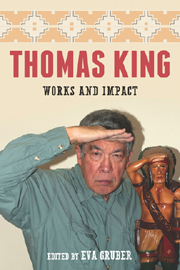Book contents
- Frontmatter
- Contents
- Preface
- Introduction
- Part 1 Works
- Part 2 Impact
- Part 3 Approaches
- 9 King's Contestatory Intertextualities: Sacred and Secular, Western and Indigenous
- 10 Thomas King's Humorous Traps
- 11 “Have I Got Stories—” and “Coyote Was There”: Thomas King's Use of Trickster Figures and the Transformation of Traditional Materials
- 12 “One Good Story”: Storytelling and Orality in Thomas King's Work
- 13 Maps, Borders, and Cultural Citizenship: Cartographic Negotiations in Thomas King's Work
- 14 One Good Protest: Thomas King, Indian Policy, and American Indian Activism
- 15 “Sometimes It Works and Sometimes It Doesn't”: Gender Blending and the Limits of Border Crossing in Green Grass, Running Water and Truth & Bright Water
- Part 4 Encounters
- Part 5 Thomas King—A Bibliography
- Notes on the Contributors
- Index
12 - “One Good Story”: Storytelling and Orality in Thomas King's Work
from Part 3 - Approaches
Published online by Cambridge University Press: 05 February 2013
- Frontmatter
- Contents
- Preface
- Introduction
- Part 1 Works
- Part 2 Impact
- Part 3 Approaches
- 9 King's Contestatory Intertextualities: Sacred and Secular, Western and Indigenous
- 10 Thomas King's Humorous Traps
- 11 “Have I Got Stories—” and “Coyote Was There”: Thomas King's Use of Trickster Figures and the Transformation of Traditional Materials
- 12 “One Good Story”: Storytelling and Orality in Thomas King's Work
- 13 Maps, Borders, and Cultural Citizenship: Cartographic Negotiations in Thomas King's Work
- 14 One Good Protest: Thomas King, Indian Policy, and American Indian Activism
- 15 “Sometimes It Works and Sometimes It Doesn't”: Gender Blending and the Limits of Border Crossing in Green Grass, Running Water and Truth & Bright Water
- Part 4 Encounters
- Part 5 Thomas King—A Bibliography
- Notes on the Contributors
- Index
Summary
Thomas King begins the 2003 Massey Lectures by saying:
There is a story I know. It's about the earth and how it floats in space on the back of a turtle. I've heard this story many times, and each time someone tells the story it changes.… One time, it was in Prince Rupert, I think, a young girl in the audience asked about the turtle and the earth. If the earth was on the back of a turtle, what was below the turtle? Another turtle, the storyteller told her. And below that turtle? Another turtle. And below that? Another turtle.… It's turtles all the way down. (King 2003, 1–2)
In this inimitable way, King evokes the fluidity and dynamism of oral storytelling traditions. His stories, whether written or spoken—and the Massey Lectures are written to be spoken and then disseminated to readers in book form—are, moreover, often narrated as multi-layered repetitions, as oral stories frequently are. These stories contain past and present and, in the end, are simultaneously and paradoxically both partial and complete. Each story evokes another, and the many-layered references that are typical of much of King's writing resonate with oral stories that are passed along from generation to generation, each story moving seamlessly from one into another, and with no single originary story underlying the web of narrative.
- Type
- Chapter
- Information
- Thomas KingWorks and Impact, pp. 199 - 209Publisher: Boydell & BrewerPrint publication year: 2012



